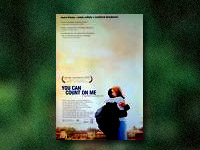You Can Count On Me (Kenneth Lonergan, 2000)

Some movies settle for being “light entertainment;” others ask profound questions about “life, the universe, and everything” from the first frame. We seem to live in a time when light entertainment is defined by the grotesque and repulsive (cf. There’s Something About Mary or Me, Myself and Irene), but the movie industry cannot give the viewing public enough of it nevertheless. On the other hand, movies with depth are as common as snowstorms on a summer’s day in Florida. One tires of waiting for them and even when they arrive, the films are often pretentious and shallow since they build on the uncertain foundations of humanism, absurdism or both.
Just when you are ready to throw in the towel, a movie comes along that is both funny and poignant, reflective and enjoyable. You Can Count on Me is just such a film.
Written, directed and even acted in by Kenneth Lonergan, Count is built around the brief visit of a rootless, undisciplined twenty-something to the homestead where his sister and her son live in upstate New York. Orphaned in childhood, Samantha and Terry Prescott have a complicated but deep love for each other that forms the heart of the movie, and a subplot of the growing relationship between Terry and Samantha’s son Rudy movingly mirrors that love, while developing its own themes.
Count could have been the sappy telling of another “relationship” story where two lonely, dysfunctional characters find true happiness in the end by learning to live with each other and triumphing over the world together. But none of that for Lonergan. Sammy and Terry will not so easily give up their stubborn, independent, coping mechanisms, hard won in starkly different ways, and the film rocks achingly back and forth between their unselfish love and concern for each other and their self-centered adherence to themselves and their contempt for each other’s choices.
Sammy, played by Laura Linney who has been nominated for an Oscar for her performance, is a loan officer at a bank. An avid church-goer, devoted mother, and trustworthy employee, she nevertheless has learned to handle the demons of her pointless life by avoidance, finding the comfort of sex and a cigarette the only means of really relaxing.
Mark Ruffalo plays her brother Terry, a drifter and his sister’s polar opposite. In and out of jail, jobs and even states (he has lived vaguely in the South and in Alaska), Terry stubbornly holds to a philosophy of movement. He avoids anything that even smells of permanence.
If the movie had stayed there, it would have been like too many others since Easy Rider: existential loners find each other and, though they remain in their despair, they at least have each other. Yawn.
But Count does something radically different for this secular age: it introduces the question of God. He is creeping back into film after a long absence; comedies like Keeping the Faith and Dogma and action pictures like Stigma and End of Days are becoming common. But dramas—“real life” pictures as it were—have lagged behind; The Big Kahuna comes to mind, but little else. Perhaps an unbelieving Hollywood doesn’t know how to even begin to write religion, but it is a gap that the movie-going public seems to want closed. Even Bergman’s The Seventh Seal is being shown at a movie club in my hometown, a sure sign both of interest and the lack of substantial films to satisfy that interest.
In three scenes of extraordinary, quiet power, You Can Count On Me portrays many of the questions people really ask of their pastors (and comments that are made to them by those who don’t believe). The questions of God’s existence gently invade the story and force the viewer to ask themselves and the characters: What does matter in life? Where do I find a “still point in a turning world?” Are there answers to the mess I find myself trapped in?
Lonergan was nominated for an Academy Award for his script. Clear, simple editing, direction and camera work also help create an atmosphere of reality in small town America, a quality often missing in Hollywood these days. Even independent, small, relational films are set in exotic climates like the New Mexico of The Tao of Steve for instance. But this movie feels like you and me. It gives us a window into that silent majority out there who really do live lives of quiet desperation as they go about their daily tasks of work, love, eating and praying. And Count offers no pat answers for that despair. As we all know, neither does life.
This review will not go further; you must take a friend and discuss with them whether the responses the movie gives are true, realistic, neither or both. But go at all costs; you won’t find a more challenging film for discussing the big questions of life.

